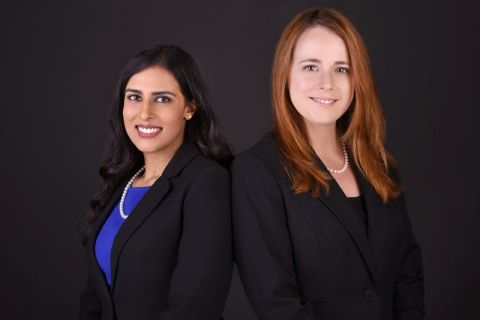
The oldest and largest of the five Queen’s Law clinical programs, Queen’s Legal Aid (QLA) has been a vital part of the Faculty’s service to the community for more than four decades. Over that time, thousands of students have got a leg up on their careers from the invaluable practical experience they gained as clinic caseworkers and volunteers. For Courtney Mulqueen, Law’00, and Rupa Karyampudi, Law’11, the founders of MK Disability Lawyers, the QLA experience continues to influence the direction of their careers and how they practice law.
Mulqueen’s and Karyampudi’s paths first crossed in 2012, when they were both practising at a busy plaintiffs’ litigation firm in Toronto. At that time, Karyampudi had just completed her articles at a personal injury boutique and was determined to build on her QLA experience, with the goal of one day starting her own law firm. She wanted to experience advocating for plaintiffs having financial, physical and emotional barriers to justice. “I knew early on that I wanted to work in a legal practice where I was helping individuals, particularly vulnerable ones,” she says. “This was in large part due to my experience at QLA, where I learned so much about the practice of law and also about interacting with clients and helping them through very difficult times in their lives.”
Like Karyampudi, Mulqueen had also envisioned having her own law practice one day. Prior to working on behalf of plaintiffs, Mulqueen had spent several years as in-house counsel, defending long-term disability insurance claims before she realized how much she missed the personal and professional satisfaction that came with helping individuals in need as she had done so many years earlier at QLA. This realization led her to make the switch to representing disabled people against the insurers she had previously defended.
In terms of the transition, Mulqueen recalls, “The substantive part was easy. It was going from representing corporate clients to individual disabled clients that was the bigger challenge. That’s where my QLA experience proved to be invaluable. I drew heavily on that experience in terms of my approach to my clients and the strategies I used to accommodate and address their individual financial, physical and psychological needs throughout the litigation.”
Not long after first meeting, the pair began discussing their experiences at Queen’s Law and in particular, their roles as caseworkers at Queen’s Legal Aid. Mulqueen and Karyampudi realized that, stemming from their common QLA roots, they shared a common vision of how they wanted to practise law. In 2016, they took the leap, realizing their common vision and founded MK Disability Lawyers (Mulqueen Karyampudi LLP), a boutique law firm dedicated to representing disabled plaintiffs in their long-term disability insurance disputes.
Speaking about their work, Mulqueen says, “Our clients are people who had been working before becoming disabled. They come to us when their long-term disability benefit claims are either denied or terminated. They suddenly find themselves without an income, but they are unable to work. It’s a very difficult time for our clients and their families. They are often very ill and now have added financial stress.”
Although MK LLP specializes in long-term disability insurance litigation, they frequently represent their clients in related employment, human rights, personal injury, motor vehicle accident and Canada Pension Plan (Tribunal) claims. In addition to providing comprehensive legal services to their disabled clients, MK Disability Lawyers also accommodates clients who are unable to leave their homes due to mobility or mental health issues and those who do not live in the Toronto area, yet require specialized legal representation for long-term disability benefit disputes.
It was in the course of meeting with some Kingston-area clients last winter that Mulqueen and Karyampudi visited the downtown Queen’s Law Clinics that since 2015 have housed QLA, as well as clinics in business law, elder law, family law and prison law. Mulqueen recalled the time when QLA worked out of a small room on the upper level of the law school and in trailers parked in the community, and she was excited to see the bright and welcoming office space now dedicated to the clinic.
In addition to a tour of the new clinic space, the law partners enjoyed reminiscing with QLA’s then-Director, Sue Charlesworth, Law’81 (who has since been appointed to the Nunavut Court of Justice), and Review Counsel Jana Mills, Law’92, and learning about the clinic’s growth and initiatives in the community over the past several years. They discussed challenges common to their respective practices, including the hurdles faced by some of their most vulnerable and disadvantaged clients and in particular, those clients struggling with mental illness.
Addressing mutual concerns regarding access to justice issues underscored the strong and lasting influence the clinic has had on both Mulqueen’s and Karyampudi’s perspectives and their approach to their law practice. They credit their QLA experience for providing them with direction and in motivating them to form MK Disability Lawyers.
Mulqueen explains, “It was my experience at QLA that made me realize how my compassion and legal training could make a real substantive difference in people’s lives. At QLA, I saw firsthand what can happen when clients feel they are being heard and understood and when they are supported and informed. For me, practising law is not just about seeking justice for my clients but also about providing them with a sense of empowerment, direction and hope.
“Queen’s Legal Aid showed me early on the incredible opportunity I had been given to do some good and it has influenced the way I practice law, ever since,” she adds. “For that, I am truly grateful.”
By Quinn Brown